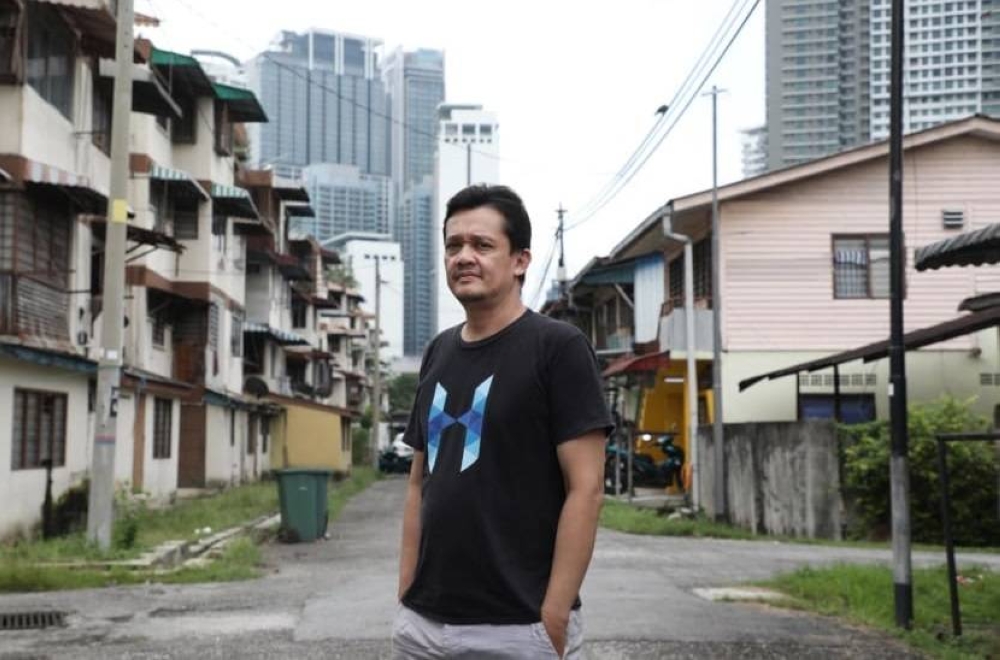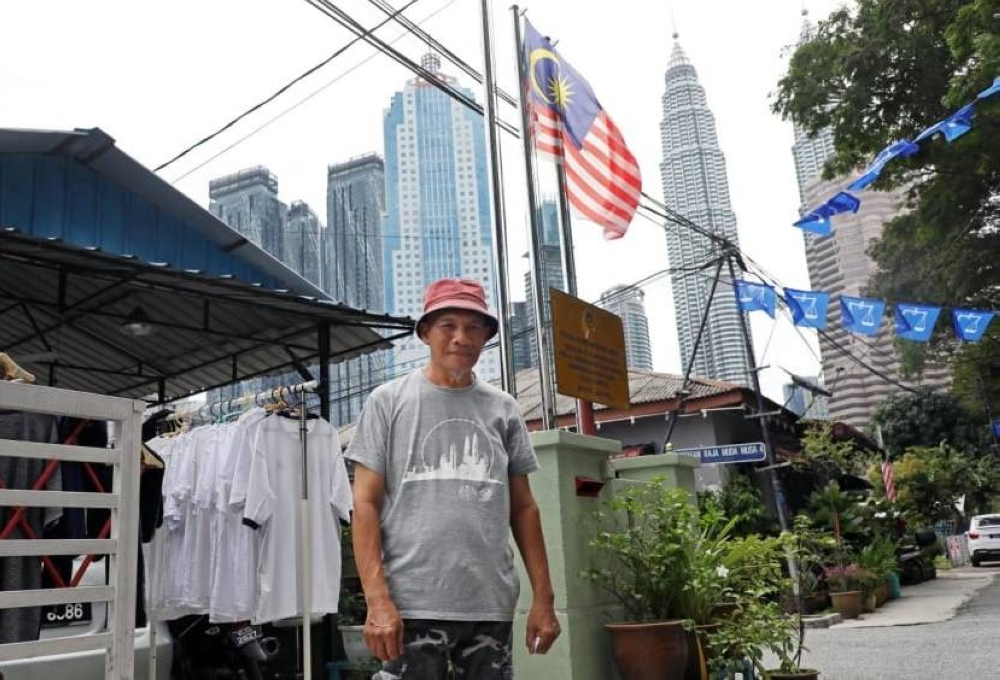KUALA LUMPUR, Nov 16 — While the nation has been debating big picture issues such as corruption, racism and even communism during this General Election campaign period, the residents of the last standing village in metropolitan Kuala Lumpur have been concerned by a different matter altogether.
The families of Kampung Baru want to know whether they might receive fairer compensation for their homes, which are facing redevelopment, under the next government.
Set just a 15-minute walk away from the Petronas Twin Towers, the 121-hectare Kampung Baru sits on prime land and is now a major tourist and foodie attraction.
Parts of it have been redeveloped over the years, to make way for train stations and other amenities.
In 2016, a developer began negotiating with homeowners on a particular strip of the village, known as Kampung Sungai Baru, to acquire it for a mixed development project.
While many of the residents have taken up the compensation offered and moved out, some 40 households remain, holding out hope that their fate will be reversed.
“Of course it’s a big issue for me! Imagine if you get evicted from where you’ve lived in since you were born, how would that make you feel?” a 66-year-old resident who only wants to be known as Ms Ani told TODAY.
Four generations of her family have lived in the same terrace house in Kampung Sungai Baru but they were given a notice in April this year stating that under the Land Acquisition Act, they must leave to make way for redevelopment.
Ms Ani and other residents of Kampung Baru who spoke to TODAY said that as they head to the polls this weekend, the fate of their land will definitely weigh on their minds.
To many of them, the issue is about more than just money or property — it is also about the heritage that will be lost if they step in with the march of modernity.
Eviction and compensation issues
Kampung Sungai Baru comprises 264 flats across eight blocks, most of which are already vacated, and 64 terrace houses, according to The Star.
While the majority of the residents this area have been progressively relocated since about five years ago, about 40 households declined to move because they found the compensation offer unsatisfactory, media reports say.
This led to the developer initiating a legal proceeding last year under the Land Acquisition Act to compel them to move out.
Some of these holdouts told TODAY they were offered around RM500 (S$151) per square foot, even though media reports have noted that an independent valuer estimated that the land alone is worth at least RM1,500 psf.
Cik Ani said the amount offered was not enough when split among her extended family members who also live in the house, which number to about a dozen people.
Another resident, Mdm Rozana Aini Isak, 50, added that to her knowledge, only three out of the 37 terrace households who opposed the move have received their compensation cheque.
This has made it difficult for them to go house hunting as they would need the money to put down a deposit, she said.
“House prices are so high now. And given our age, you don’t really expect us to take up a new loan, especially with the rising interest rates?” she added.

The loss of a Malay enclave
When TODAY visited the enclave on the morning of Nov 13, tourists were seen taking in the scenery of wooden and brick kampung houses set against the skyline of the Petronas Twin Towers.
The wide array of food joints and a picturesque Saloma Link pedestrian bridge connecting residents to the Kuala Lumpur City Centre draws many visitors, while nearby amenities like MRT and LRT stations and a public hospital provide convenience to residents.
“It was so easy to bring my late-mother to the hospital, barely a five-minute motorcycle ride away,” said Mr Muhammad Tarmizi Sulaiman, 46, a flat resident in Kampung Sungai Baru, citing the convenience as another reason why residents are reluctant to move out.
Meanwhile, some residents associate the place with an intangible value — "maruah Melayu" or the dignity of the Malay community.
“This is a Malay enclave. We don’t want to see Malays losing their land,” said Ms Redhatul Jannah, 24, when asked why the eviction issue mattered to her even though her house is not located within the plot of land earmarked for redevelopment.
A large bulk of Kampung Baru was recognised as a Malay community settlement in 1900, meaning only ethnic Malays could occupy the space. Houses in Sungai Baru, on the other hand, sit on a 99-year lease not subject to such racial restrictions.
Another resident, Mr Adam Mohd Sahat, was concerned that once the redevelopment project is completed, houses there will be sold at a high price due to its prime location, effectively pricing out original residents who mostly belong in the bottom 40 per cent of income earners.
“It’s not about the price, it's about the maruah of Malays. I’m concerned that they will be evicted from their land ... and can’t return after being outpriced,” said the 65-year-old.

Wanted: An accessible MP
Kampung Baru also has a special significance in Pakatan Harapan’s (PH) chairman Anwar Ibrahim’s political journey. It was here where 20,000 supporters had gathered to mark the end of his political ban back in 2008.
Yet if one were to walk through the neighbourhood now, they would notice that buntings and banners for other coalitions — even the nascent Gerakan Tanah Air — far outnumber PH flags.
Also conspicuously displayed is a big banner that reads ‘‘KHALID SAMAD YOU ARE NOT WELCOME AT KAMPONG BHARU - Youths of Kampong Bharu”, referring to the PH candidate for Titiwangsa parliamentary seat, which Kampung Baru falls under.
The incumbent Member of Parliament (MP) is Ms Rina Harun from Parti Pribumi Bersatu, which was a component party of PH until 2020 when it left to join the Perikatan Nasional coalition.
“You can’t judge the level of support based on the number of flags here,” said one PH volunteer whom TODAY crossed paths with, when asked about the seemingly underwhelming display of support for the PH coalition.
Mr Amir Ridzuan Osman, 60, who has lived there for almost 40 years, claimed that the community is unhappy with the PH candidate as he has publicly backtracked on his promises regarding the land acquisition issue, adding uncertainty and frustration to residents.
Residents who support his main opponent, Barisan Nasional’s Johari Abdul Ghani, cited the infrastructure improvement projects he had carried out as a Member of Parliament there and his constant presence in the neighbourhood even after losing the 2018 elections.
“When someone invites him to a wedding here, he would attend. When somebody passes away, he would visit the family,” said a 55-year-old resident who only gave her name as Ms Norazizah.
“He has been helping residents here since my late mother’s time. He continues until today, and has given more assistance than (incumbent) Rina Harun, like during floods or Covid-19,” said Mr Tarmizi.
On the other hand, some residents like Ms Ani, said they were disappointed that Mr Johari had “washed his hands off” when approached about the eviction.
"He kept repeating, 'I've no power, I've no power', 'I can't do anything' when we approached him," said Ms Ani.
Agreeing, Ms Rozana added: “The least he could have done was voice out for us, keep his door open, maybe refer us for a meeting with (caretaker) Federal Territories Minister Shahidan Kassim, but nothing.”
Regardless of their political affiliation, residents were unanimous in their expectation that the next MP must be accessible when residents are in need of help.
A young resident who only wanted to be known as Ms Aishah said more often than not, the community resorts to mutual help as assistance from authorities is usually insufficient or inconsistent.
“A parliamentarian should really show concern for the people he represents, not just show his or her face during the election campaign,” said the 30-year-old. — TODAY



















